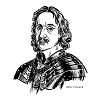The English Civil Wars
The English Civil Wars were fought between King Charles I and Parliament. 250,000 people died in the conflict, and the King himself was executed for treason.

In the First Civil War (1642 to 1646) the East and South-East declared for Parliament; the West, North and Wales declared for the King. It culminated with the Battle of Naseby in 1645, and the King's surrender a year later.
The Second Civil War (1648 to 1649) was a set of uprisings by the ing's supporters, which led to his trial for treason, and his beheading at Whitehall on 30 January 1649.
The Third Civil War (1650 to 1651) was a failed attempt by Charles I's son, the future Charles II, to seize the throne.

After the King's execution, Oliver Cromwell, then his son Richard, governed England. His republic, or 'Commonwealth', lasted until the 'restoration' of Charles II in 1660.